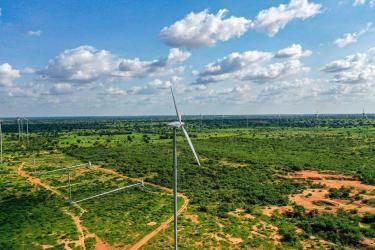Beyond droughts and floods, climate change has exacted a toll on Nigeria, evident in rising food prices, struggling farmers, damaged infrastructure, and cities strained by recovery costs. As these challenges grow, the financial demand for climate adaptation has never been more urgent. With climate change threatening to slash Nigeria’s Gross Domestic Product (GDP), robust climate adaptation policies are essential.
Agriculture, which employs over 37.99% of Nigeria’s workforce and contributes around 24% of the GDP, has been severely impacted by climate change. Unpredictable rainfall, increasing temperatures, and frequent droughts destabilize the sector. For a country where over 80% of farmers are smallholders relying on seasonal rainfall, these disruptions pose a substantial economic risk.
Erratic weather patterns interrupt crop cycles, reducing yields and raising food production costs. For instance, staples like maize, rice, and millet have seen drops in productivity due to unpredictable rains and extended dry spells. This reduces farmers’ incomes, raises food prices, pushes inflation higher, and places additional financial strain on Nigerian households, which already spend a substantial portion of their income on food.
Climate change also affects livestock farming. Higher temperatures and water scarcity lower pasture quality and reduce water sources for livestock. This cuts into livestock productivity, raises production costs, and impacts national food security.
These agricultural setbacks hit GDP directly by lowering productivity, reducing export earnings, and causing job losses in rural areas. Without adaptation measures, Nigeria’s agricultural sector could lose billions of dollars annually, weakening an economy already grappling with other challenges.
Nigeria’s infrastructure also struggles under the weight of climate extremes. Coastal cities and riverine communities, in particular, face frequent damage from floods. Roads, bridges, and drainage systems suffer, leading to high repair and maintenance costs.
For instance, Lagos, a major commercial hub with over 15 million people, is increasingly vulnerable to sea-level rise and flooding. Floods damage transportation networks, housing, and businesses. Recent floods have caused severe road damage, delaying transportation, disrupting the flow of goods and people, and increasing costs for businesses. Higher transport costs, in turn, inflate the prices of essential goods.
According to the World Bank, Nigeria loses approximately $4 billion annually due to floods. These funds, which could otherwise support development projects, are instead redirected to costly repairs and emergency responses. As climate disruptions intensify, these maintenance and repair costs are projected to rise.
The Strain on Urban Infrastructure
Nigeria’s cities, already struggling to keep up with rapid population growth, are particularly vulnerable to climate stress. Floods often overwhelm drainage systems, roads, and informal settlements, causing property damage and economic losses. For low-income households, the impact is even more severe, as limited resources make recovery challenging. Without climate-resilient infrastructure, these costs will continue rising, further straining city budgets and reducing available funds for essential services.
The economic toll of climate change on Nigeria is no longer speculative; it is visible in GDP data. A recent National Bureau of Statistics report estimates that climate change could reduce Nigeria’s GDP by 2–11% by 2050, amounting to billions in lost output yearly. This would impact various sectors, especially those heavily dependent on natural resources and stable weather patterns, like agriculture and fishing.
The economic instability caused by climate impacts may also deter investors, further limiting growth and foreign direct investment.
Health Costs and Productivity Losses
Climate-related health impacts add an indirect cost to Nigeria’s GDP. Rising temperatures and unpredictable weather increase diseases like malaria and cholera and heat-related illnesses. Healthcare costs and productivity losses from sick workers compound the economic burden. When families spend more on healthcare, disposable income decreases, slowing overall consumer spending and economic growth.
Pathways to Resilience
In response to mounting costs, Nigeria must prioritize climate adaptation to safeguard its economy. Adaptation is not merely an environmental necessity but a financial imperative. International estimates indicate Nigeria needs around $10 billion annually to effectively implement climate adaptation strategies to curb these losses and build resilience.
Key areas for investment include climate-resilient farming practices like drought-resistant crops, improved irrigation systems, and sustainable land management. These practices protect farmers’ incomes, stabilize food prices, and support broader economic stability.
Reinforcing critical infrastructure, especially in flood-prone regions, is essential. Investing in flood defenses, early warning systems, and climate-proofed roads can help mitigate damage and economic losses.
Enhancing healthcare capacity to address climate-related diseases is also critical. Building health facilities in vulnerable areas, improving sanitation infrastructure, and raising awareness about climate-related health risks are key steps.
Developing effective disaster response mechanisms, including early-warning systems and emergency resources, will reduce recovery costs and mitigate the impact of extreme weather.
Funding and Policy Mechanisms
Funding these adaptation measures remains a challenge. Nigeria’s climate adaptation efforts rely heavily on international grants and loans, which are often insufficient. Nigeria could explore alternative funding options, such as climate bonds, carbon pricing, and public-private partnerships. Additionally, policies encouraging private investment in renewable energy and sustainable agriculture could attract more funding and lessen the burden on government resources.
Climate adaptation is a smart financial choice that goes beyond environmental protection; it’s an investment in Nigeria’s long-term economic stability. With sufficient funding, robust policies, and collaborative efforts, Nigeria can confront the financial costs of climate change head-on, ensuring a secure economic future for its citizens.
Climate change in Nigeria has led to significant economic challenges, including rising food prices, damages to infrastructure, and increased recovery costs, necessitating urgent adaptation measures. Agriculture, vital to Nigeria’s economy, suffers from erratic weather, which disrupts crop cycles, reduces yields, and raises food production costs, severely impacting the GDP. Similarly, livestock farming faces issues due to higher temperatures and water scarcity. Climate impacts also erode infrastructure, especially in coastal and urban areas, leading to costly damages and repairs.
The economic toll extends to potential GDP reduction of 2–11% by 2050, with health costs due to diseases like malaria and heat-related illnesses adding indirect burdens. To counteract these losses, Nigeria needs climate-resilient strategies, requiring approximately $10 billion annually. Investments in sustainable farming, reinforced infrastructure, and enhanced healthcare, alongside effective disaster response mechanisms, are essential. Funding remains a challenge, highlighting the need for diverse financial solutions like climate bonds and private partnerships. These adaptation efforts are critical for ensuring Nigeria’s long-term economic resilience.






